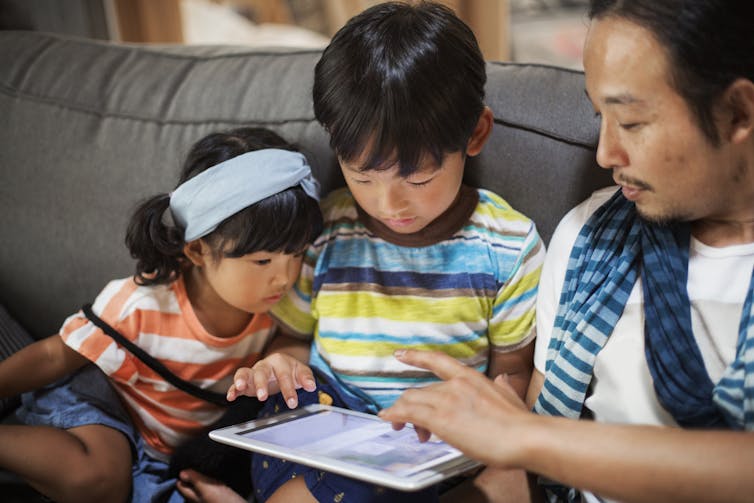Screen time that supports new parents and young kids can enhance family health
Mobile health apps, teleconferencing with experts and thoughtfully designed educational platforms can all help families during the chaotic and confusing early years.

Screen time for little kids takes a lot of heat under normal conditions. The American Academy of Pediatrics’ official recommendations urge families to be thoughtful and judicious about screen time for youngsters from birth to age five. And there is evidence that too much technology can lead to loss of child development opportunities.
But technology can also connect families to important parenting and educational opportunities, especially at a time when people are sheltering in place and avoiding health care facilities for all but the most pressing concerns. The current generation of parents are digital natives themselves, having grown up in an era when internet was readily accessible. They often prefer technological solutions for their families.
We are a professor of social work and a neonatologist interested in how using internet-supported technologies – including apps, voice and text messaging, videoconferencing and e-learning platforms – can ease the parenting burden and promote healthy development. Reducing burdens on parents and increasing access to parent support are vital elements in helping families raise healthy children.
Trusted info within arm’s reach
Users can access apps, websites and programs from their cellphones or computers to receive information about medical tests, screenings and how to make healthier choices.
Phone apps can put trusted medical information right into a parent’s hand. Users can skip the hassle of having to visit a clinic or class. Health care providers recommend free apps like NICU2Home, Providence Hospital Systems’ Circle and March of Dimes’ My NICU Baby to their patients as sources of tips and helpful videos about how to care for a baby. The apps can help do things like track breastfeeding sessions, baby’s sleep patterns and baby’s weight; teach medical terminology; and connect families to others with similar experiences.
App can also provide task lists that ease a family’s transition from hospital to home with a newborn. For example, these apps can tell families about to be discharged from a NICU what supplies and special equipment they will need to have at home to support their baby after leaving the hospital. Having access to this information in an app, rather than a paper handout from a doctor, means it can be easily accessed on demand and won’t get lost in the shuffle of family life.
One of us (Dr. Lakshmanan) created the app Baby Steps LA to help families and children with special health care needs at Children’s Hospital Los Angeles. The app includes information about how social factors like housing, insurance and food security can influence health and offers related resources.
There are also several apps that focus on the importance of peer support groups and how important they can be for new mothers.
Cellphones can potentially help new parents, even without specific apps installed. One study found that new mothers who received text messages with tips about breastfeeding and child development while enrolled in the Supplemental Nutrition Program for Women, Infants, and Children breastfed their children more consistently and for a longer period of time.
Text messaging chatbots like ParentSpark use artificial intelligence and user patterns to respond to parents’ queries on topics like feeding and exercise, helping inform their choices and teach new strategies.
Families can even turn to video games to help prepare them for discharge from the hospital or to learn about medical conditions.
Connecting to live experts via screens
Telehealth is an important option for families with young children, because it expands access to medical, mental health and developmental care options, especially in areas where there are limited numbers of specialty providers. Parents and their children can videoconference with experts, reducing time spent traveling and in waiting rooms.
The expansion of autism services on telehealth platforms is a prime example of how this technology can meet the needs of families with young children. Families can access screening, early diagnosis, applied behavior analysis, speech language pathology, parent training and overall treatment planning from home by logging into a videoconferencing platform and speaking to a live provider.
Families can also access parent support and parent training, including developmental assessments, using telehealth. One of us (Dr. Traube) designed a service called Virtual Home Visitation that gives families direct access to a parenting coach who guides them through activities that support their child’s development using videochat technology.
These services can be difficult to find in local communities. But, through weekly screen interactions with a parenting coach, families can promote their child’s development, ensure any developmental delays are quickly identified and find intervention options early.
Online content aimed at kids
Plenty of research indicates that young children should not interact with video games or content to the exclusion of books or in the absence of an adult to coach them.
But thoughtfully built educational platforms can be a productive way for parents to use technology to support their child’s early learning. When designed with child development research in mind, content platforms offering games, e-books, and videos can help kids build motor, socio-emotional and cognitive skills, as well as help to reduce skill gaps in important foundational areas like color, letter and number recognition.

For example, studies suggest that well-designed e-books can support early literacy. Thoughtful use of highlighting, or animating relevant parts of picture or text, and interactive features including dictionaries, word readouts or learning games can help with word learning and reading.
When parents assess e-learning platforms, they should evaluate them on the basis of whether they are engaging, actively involve the child, have meaningful content, and demonstrate or encourage social interaction. Organizations including Public Broadcasting Service and Sesame Workshop focus on early childhood and have invested a lot of research into developing trustworthy e-platforms.
Over two-thirds of Americans use mobile health applications and the iTunes and Android app stores offer more than 165,000 of them. All of these technologies offer health care providers an opportunity to meet families where they are whenever they need us. Done right, they could lead to sustainable improvements in child health and development.
Dorian Traube receives funding from the Overdeck Family Foundation, Gary Community Investments, Parsons Foundation, and Queenscare Foundation.
Ashwini Lakshmanan receives funding from the Sharon D. Lund foundation and the Zumberge Diversity and Inclusion Award. She previously received funding from the National Institutes of Health, the Packard foundation for Children's Health and the Confidence Foundation.
Read These Next
Trump’s Greenland ambitions could wreck 20th-century alliances that helped build the modern world or
How the US treats its allies has been a crucial question for every president. What evolved over the…
Are there thunderstorms on Mars? A planetary scientist explains the red planet’s dry, dusty storms
A rover recently captured sounds of lightning crackling on Mars, over a decade after scientists uncovered…
Chavismo has adapted before – but can Venezuela’s leftist ideology become US friendly and survive?
The ideology named after former Venezuelan leader Hugo Chávez became more authoritarian under Nicolás…






